
The Four Seasons is an American vocal quartet formed in 1960 in Newark, New Jersey. Since 1970, they have also been known at times as Frankie Valli and the Four Seasons. The band evolved out of a previous band called The Four Lovers, with Frankie Valli as the lead singer, Bob Gaudio on keyboards and tenor vocals, Tommy DeVito on lead guitar and baritone vocals, and Nick Massi on bass guitar and bass vocals. On nearly all of their 1960s hits, they were credited as The 4 Seasons. The band had two distinct lineups that achieved widespread success: the original featuring Valli, Gaudio, DeVito, and Massi that recorded hits throughout the 1960s, and a 1970s quintet consisting of Valli, Lee Shapiro, Gerry Polci, Don Ciccone and John Paiva, with Gaudio and Long providing studio support.
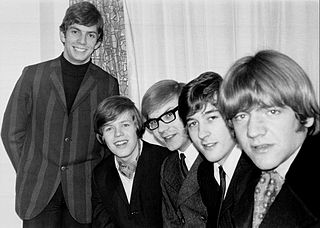
Herman's Hermits are an English rock and pop group formed in 1963 in Manchester and fronted by singer Peter Noone. Known for their jaunty beat sound and Noone's often tongue-in-cheek vocal style, the Hermits charted with numerous transatlantic hits in the UK and in America, where they ranked as one of the most successful acts in the Beatles-led British Invasion. Between March and August 1965 in the United States, the group logged twenty-four consecutive weeks in the Top Ten of Billboard's Hot 100 with five singles, including the two number ones "Mrs. Brown You've Got a Lovely Daughter" and "I'm Henry VIII, I Am".
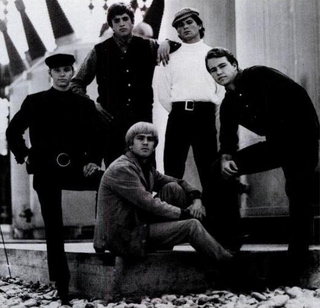
The Electric Prunes are an American psychedelic rock band, formed in Los Angeles, California, in 1965. Much of the band's music was, as music historian Richie Unterberger described it, possessed of "an eerie and sometimes anguished ambiance." Their most successful material was by songwriters Annette Tucker and Nancie Mantz, though the group also penned their own songs. Incorporating psychedelia and elements of embryonic electronic rock, the band's sound was marked by innovative recording techniques with fuzz-toned guitars and oscillating sound effects. In addition, guitarist Ken Williams' and singer James Lowe's concept of "free-form garage music" provided the band with a richer sonic palette and exploratory lyrical structure than many of their contemporaries.

Manfred Mann were an English rock band, formed in London and active between 1962 and 1969. The group were named after their keyboardist Manfred Mann, who later led the successful 1970s group Manfred Mann's Earth Band. The band had two different lead vocalists, Paul Jones from 1962 to 1966 and Mike d'Abo from 1966 to 1969.

The Turtles are an American rock band formed in Los Angeles, California, in 1965 and best known for their 1967 hit song "Happy Together". They charted several other top 40 hits, including "It Ain't Me Babe" (1965), "You Baby" (1966), "She'd Rather Be With Me" (1967), "Elenore" (1968) and "You Showed Me" (1969).

The Hollies are an English rock and pop band formed in 1962. One of the leading British groups of the 1960s and into the mid-1970s, they are known for their distinctive three-part vocal harmony style. Allan Clarke and Graham Nash founded the band as a Merseybeat-type group in Manchester, although some of the band members came from towns further north, in east Lancashire. Nash left the group in 1968 to form Crosby, Stills & Nash, though he has reunited with the Hollies on occasion.

Paul Revere & the Raiders were an American rock band formed in Boise, Idaho, in 1958. They saw considerable U.S. mainstream success in the second half of the 1960s and early 1970s. The band was known for including Revolutionary War-style clothes in their attire.

"I Heard It Through the Grapevine" is a song written by Norman Whitfield and Barrett Strong for Motown Records in 1966. The first recording of the song to be released was produced by Whitfield for Gladys Knight & the Pips and released as a single in September 1967. It went to number one on the Billboard R&B Singles chart and number two on the Billboard Pop Singles chart and shortly became the biggest selling Motown single up to that time.

Charles Wright & the Watts 103rd Street Rhythm Band is an American soul and funk band. Formed in the early 1960s, they had the most visibility from 1967 to 1973 when the band had 9 singles reach Billboard's pop and/or rhythm and blues charts, such as "Do Your Thing", "Till You Get Enough", and "Love Land". They are best known for their biggest hit on Warner Bros. Records, 1970's "Express Yourself", a song that has been sampled by rap group N.W.A and others.
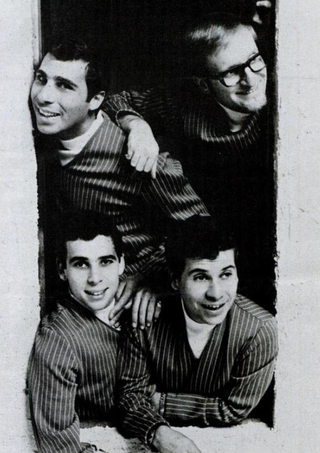
The Tokens were an American doo-wop band and record production company group from Brooklyn, New York City. The group has had four top 40 hits on the Billboard Hot 100, all in the 1960s, their biggest being the chart-topping 1961 hit single "The Lion Sleeps Tonight". "The Lion Sleeps Tonight" borrowed heavily from the 1939 song "Mbube" by South African singer Solomon Linda. They are also known for having Neil Sedaka as an original member, before he pursued a solo career.

"Dancing in the Street" is a song written by Marvin Gaye, William Stevenson, and Ivy Jo Hunter. It first became popular in 1964 when recorded by Martha and the Vandellas whose version reached No. 2 on the Billboard Hot 100 chart and peaked at No. 4 in the UK Singles Chart. It is one of Motown's signature songs and is the group's premier signature song.
"I Got Rhythm" is a piece composed by George Gershwin with lyrics by Ira Gershwin and published in 1930, which became a jazz standard. Its chord progression, known as the "rhythm changes", is the foundation for many other popular jazz tunes such as Charlie Parker's and Dizzy Gillespie's bebop standard "Anthropology ".
"Summertime" is an aria composed in 1934 by George Gershwin for the 1935 opera Porgy and Bess. The lyrics are by DuBose Heyward, the author of the novel Porgy on which the opera was based, and Ira Gershwin.

"The Happening" is a 1967 song recorded by Motown artists The Supremes. It served as the theme song of the 1967 Columbia Pictures film The Happening, and was released as a single by Motown at the time of the film's release that spring. While the movie flopped, the song peaked at number 1 on the Billboard Hot 100 pop singles chart in May, becoming The Supremes' tenth number 1 single in the United States, peaking in the top 10 on the UK Singles Chart at number 6, and in the top 5 in the Australian Pop Chart and in the Dutch Pop Chart.
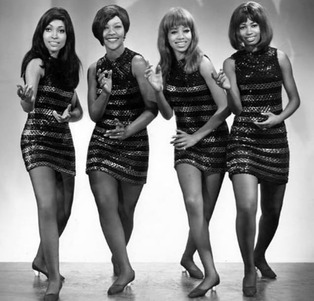
The Ikettes, originally The Artettes, were a trio of female backing vocalists for the Ike & Tina Turner Revue. Despite their origins, the Ikettes became successful artists in their own right. In the 1960s they had hits such as "I'm Blue " and "Peaches 'N' Cream". In 2017, Billboard ranked "I'm Blue " No. 63 on its list of 100 Greatest Girl Group Songs of All Time.

David Libert was an American music executive, musician, and author. He was one of the founding members of the musical group, The Happenings. Hailing from Paterson, New Jersey, The Happenings had a number of hit records, including "See You in September" and a cover of "I Got Rhythm", each peaking at number 3 on the Hot 100, in 1966 and 1967, respectively.
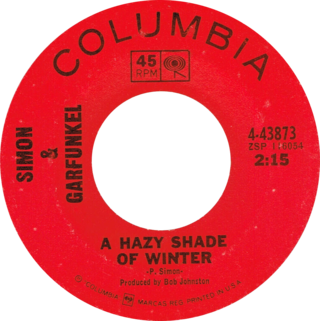
"A Hazy Shade of Winter" is a song by American music duo Simon & Garfunkel, released on October 22, 1966, initially as a stand-alone single, but subsequently included on the duo's album Bookends (1968). It peaked at number 13 on the Billboard Hot 100.
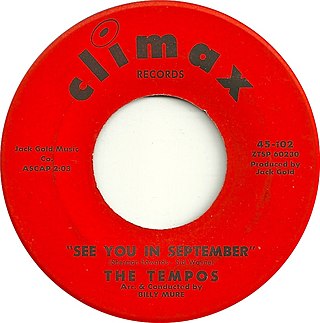
"See You in September" is a song written by Sid Wayne and Sherman Edwards. It was first recorded by the Pittsburgh vocal group the Tempos. This first version peaked at No. 23 in the USA in the summer of 1959, and No. 16 in Canada. The most popular take on "See You In September" was by the Happenings in 1966, which reached No. 3.
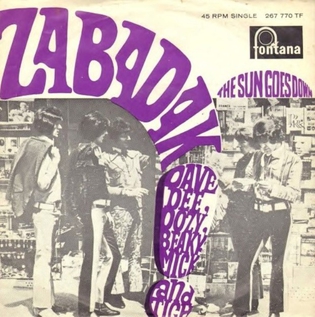
"Zabadak!" is a song by British musical group Dave Dee, Dozy, Beaky, Mick and Tich, written by Ken Howard and Alan Blaikley. It was released as a single in September 1967, peaking at number 3 on the UK Singles Chart and becoming the group's only single to chart on the Billboard Hot 100, peaking at number 52. It was their fifth of seven to chart in Canada.
"The River Is Wide" was a song written by Billy Admire and Gary Knight and was originally recorded by the Forum in 1967.

















